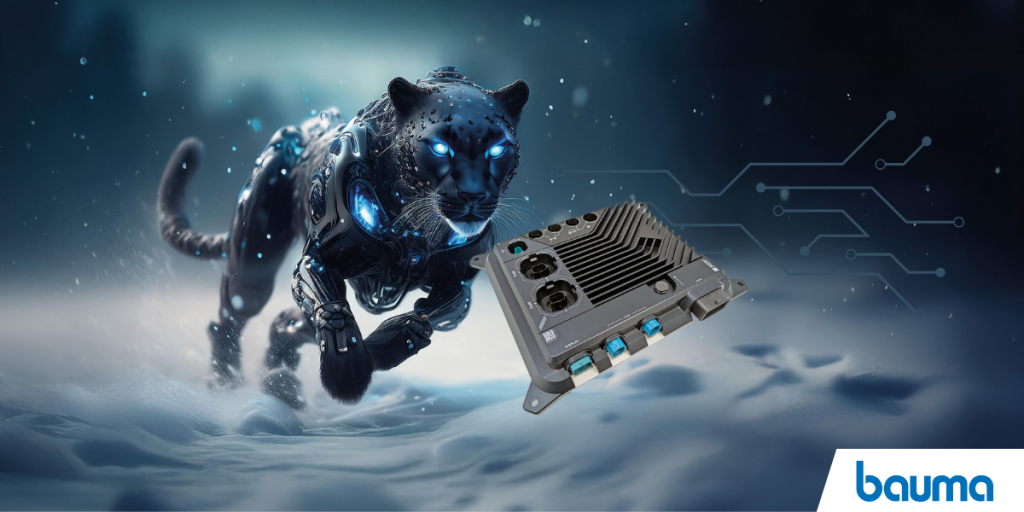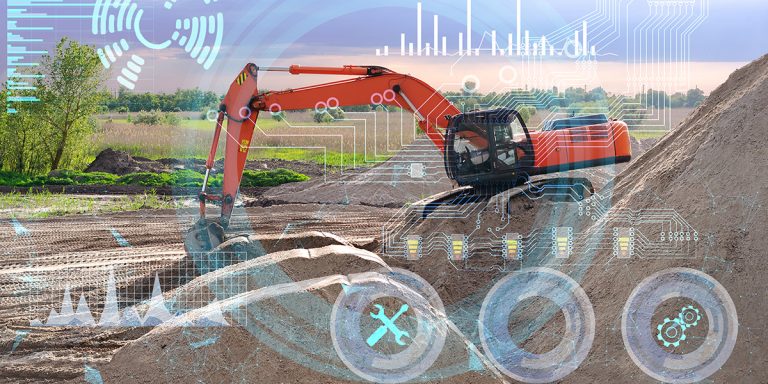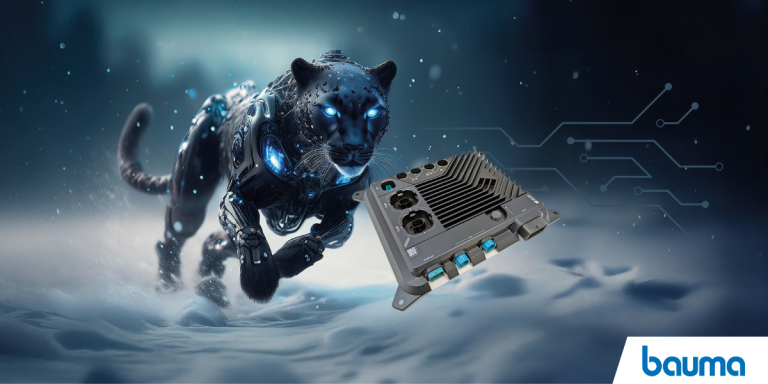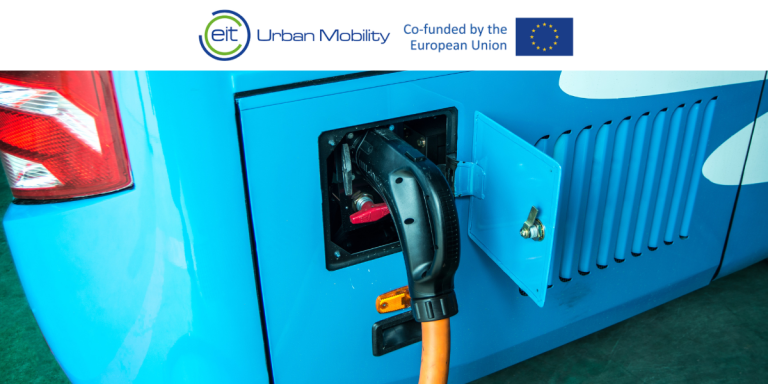Extract of BAUMA 2025 Press Kit. The special vehicle industry is undergoing a profound transformation driven by the need for connectivity, data and information management, and increasing demands for performance and sustainability. These developments are leading to a deep evolution of machinery, making them increasingly connected, intelligent, and data-driven. To address these challenges, ACTIA supports manufacturers with smart and scalable solutions, covering the entire vehicle lifecycle—from engineering to operation. As a pioneer in embedded electronic architectures and diagnostics, ACTIA leverages its expertise in data management, cybersecurity, and connectivity to help OEMs optimize their machines and develop new business models.
A Market in full transformation: Challenges and opportunities for manufacturers
The industrial vehicle market is experiencing an unprecedented shift, driven by economic, technological, and environmental dynamics that are reshaping manufacturers’ priorities. In a globalized world with diverse requirements, manufacturers must also adapt their solutions to the specificities of each region.
Europe & North America: A market driven by regulations and the energy transition
In Europe and North America, the industrial vehicle market is strongly impacted by emission and cybersecurity regulations, pushing manufacturers to accelerate the integration of cleaner and more secure technologies. The implementation of Stage V (Europe) and Tier 4 Final (USA) standards mandates a drastic reduction in pollutant emissions, boosting the sales of electric and hybrid machinery by +40% in 2023 (source: Off-Highway Research). Additionally, the European RED II (Renewable Energy Directive II) encourages the electrification of industrial equipment and the development of low-carbon solutions, prompting manufacturers to invest in alternative powertrains and adapted charging infrastructures. At the same time, increasing cybersecurity requirements through the NIS 2 Directive and the Cyber Resilience Act compel manufacturers to integrate advanced data protection protocols and secure remote maintenance solutions. This dual transition toward electrification and connectivity is redefining the sector’s priorities, placing innovation and digitalization at the heart of development strategies.
Asia: A rapidly expanding market driven by urbanization and digitalization
Asia is experiencing sustained growth in infrastructure investments, with an annual increase of +7% in budgets allocated to construction projects (source: McKinsey, 2024). This trend is significantly boosting the demand for connected and automated industrial machinery, particularly in China and India, where 80% of new machines will be equipped with telemetry and AI technologies by 2027 (source: MarketsandMarkets).
Africa & South America: Markets demanding robustness and reliability
In Africa and South America, where the mining, agriculture, and infrastructure sectors dominate, industrial machinery must operate under extreme conditions (heat, humidity, and difficult terrain). Robustness and reliability are essential to ensure equipment longevity and minimize maintenance costs, especially since access to spare parts and after-sales services is sometimes limited.
A Growing demand: The African Development Bank forecasts an annual +6% growth in infrastructure investments by 2030, while the South American mining sector accounts for 5% of the regional GDP, reinforcing the need for durable and high-performance machinery.
Connectivity and optimized maintenance: To address local challenges, manufacturers are focusing on embedded diagnostics and remote maintenance solutions, enabling predictive maintenance and maximizing machine availability through OTA (FOTA) updates.
Autonomous, easy-to-maintain, and modular equipment is preferred, with standardized components to simplify repairs and optimize fleet management. These rapidly growing markets offer key opportunities for industrial equipment manufacturers, requiring an approach that combines innovation and sustainability to meet local realities.
Key Fact:
According to Verified Market Reports*, the off-highway vehicle telematics market was valued at $488.4 million in 2023 and is expected to reach $1,439.5 million by 2030, with a compound annual growth rate of 16.8% between 2024 and 2030.
“All-Digital”: A new era for the special machinery industry
With regional developments and the rise of digitalization, industrial requirements are evolving drastically. Manufacturers must now maximize productivity through data and connectivity while reducing their energy and environmental footprint.
The industrialization of the “all-digital” approach is leading to new business models, where connected services play a crucial role: predictive maintenance, pay-per-use models, fleet management platforms, and remote software updates are becoming industry standards.
An electronic architecture under pressure
The increasing integration of electrification, artificial intelligence, cybersecurity, and autonomous systems is forcing industrial players to rethink their electronic architectures.
In a sector where equipment must operate for decades, embedded systems must be scalable and adaptable to evolving standards and market expectations. This growing technical complexity requires the development of flexible, modular, and interoperable solutions—the only way to ensure manufacturers’ longevity and competitiveness.
Digitalization: A driver of competitiveness for industrial players
Digital transformation is emerging as a major strategic lever to tackle efficiency, safety, sustainability, and economic performance challenges.
In a sector traditionally focused on mechanics, the convergence of embedded electronics, connectivity, and data intelligence is becoming a key differentiator. Industrial players must now navigate multiple simultaneous challenges:
- Increasing complexity: Adoption of new practices such as predictive maintenance, usage-based connectivity, OTA software updates, and advanced embedded services.
- Heightened regulatory pressure: Strengthened cybersecurity, emissions reduction, real-time machine tracking, and compliance with evolving standards.
- Technological acceleration: The rapid development of AI, electrification, autonomous systems, and centralized electronic architectures.
In this context, digitalization is becoming the central pillar of manufacturers’ business models, redefining their competitiveness in a rapidly evolving market.
ACTIA: The strength of a pioneer group driving the digitalization of Off-Highway vehicles
With 40 years of experience in vehicle architecture, embedded electronics, and diagnostics, ACTIA is a pioneer in vehicle data management and exploitation. Its expertise spans a wide range of land mobility sectors, including passenger cars, heavy trucks, buses and coaches, and rail transport.
A legacy of expertise driving the digitalization of vehicles
Since its founding in 1986, ACTIA has supported equipment manufacturers through tenders, architecture specifications, and close collaborations with OEM engineering teams. This deep immersion in industrial vehicle engineering provides ACTIA with extensive knowledge of vehicle electronics, allowing it to offer tailored solutions that meet the unique constraints of various market segments.
A unique integration of technological and industrial Excellence
With in-house R&D teams and electronic production facilities, ACTIA ensures full control over the development and manufacturing cycle. Unlike other market players who outsource some of their components, ACTIA designs, produces, and integrates all the key technological building blocks necessary for the digitalization of industrial machinery.
ACTIA’s strength lies in its synergy
ACTIA leverages a cross-disciplinary approach to capitalize on innovation and expertise across its subsidiaries. By pooling technological advancements from different mobility markets, the group rapidly adapts its solutions to the specific requirements of the off-highway sector, offering an agile response to manufacturers’ new challenges.
With its international presence and close relationships with industrial players, ACTIA supports its customers across all land mobility vehicle sectors, providing them with differentiated expertise and a global vision that integrates connectivity, electrification, and performance optimization.
“At ACTIA Group, we are architects of embedded electronics. We maintain long-standing partnerships with vehicle manufacturers, giving us in-depth knowledge of vehicle electronics. For decades, we have supported our customers through tenders, electronic architecture definition, and close collaboration with their engineering teams. This deep immersion in industrial vehicle engineering enables us to anticipate their needs and tailor our solutions to the specific constraints of each segment.
Beyond this expertise, we have built a unique technological and industrial ecosystem, integrating design, manufacturing, and the implementation of key digitalization components for industrial machinery. Unlike other players, we have made a strategic choice to control the entire value chain, from R&D and industrialization to production and deployment in the field. This approach ensures total technological consistency, optimized performance, and seamless system interoperability while guaranteeing quality, scalability, and long-term viability for our customers.
Finally, ACTIA Group’s synergy is a major asset: with our specialized engineers and global presence, we remain closely aligned with manufacturers and their challenges. This worldwide network allows us to provide solutions tailored to diverse operational realities, combining customer proximity with continuous innovation.” — Davide LOY, VP for the Off-Highway Market
From design to on-field performance: ACTIA at the heart of industrial vehicle digitalization
ACTIA masters all technological layers of vehicles, offering manufacturers a comprehensive approach to accelerate the digitalization of industrial vehicles. Real-time data utilization has become a key factor in optimizing operational efficiency and predictive maintenance. By remotely analyzing machines—cross-referencing equipment technical data with real-world usage information—ACTIA helps manufacturers maximize vehicle performance and availability.
By integrating embedded controllers, advanced telematics units, flexible architectures, and data exploitation solutions, ACTIA offers a unique and modular technological ecosystem. This ecosystem is structured in layered services throughout the entire vehicle lifecycle. This approach allows OEMs to customize data and develop tailor-made services that perfectly meet the specific needs of their end customers and users.
Custom controllers and telematics units for extreme environments
ACTIA’s hardware layer is one of the key pillars of its offering. Off-road, agricultural, and construction vehicles require electronic systems capable of operating for decades in extreme conditions (shocks, dust, extreme temperatures). The group stands out for its ability to design and manufacture in-house ruggedized controllers and telematics units tailored to the strict requirements of the off-highway sector and other industrial applications.
High-performance embedded controllers for scalable architectures

Building on this expertise, ACTIA is now developing a High-Performance Computer (HPC) platform—an essential technological building block for new vehicle architectures. Rooted in ACTIA’s historical expertise in embedded controllers, the HPC is the natural evolution of this competency, addressing the growing demand for computing power and centralized management of next-generation electronic architectures.
Smart telematics units for connectivity and diagnostics
Similarly, ACTIA’s telematics units, designed for optimal connectivity and remote diagnostics, are integrated directly into the manufacturing process, ensuring strict quality control and perfect alignment with manufacturers’ needs. This vertical integration enables ACTIA to deliver robust, secure, and innovative products tailored to the demands of modern industrial vehicles and the most challenging work environments. By mastering the design and manufacturing of controllers and telematics units, ACTIA provides a solid foundation for industrial vehicle digitalization, positioning itself as a strategic partner for manufacturers in the digital transformation of their equipment.
Flexible architecture and interoperability: ACTIA, the architect of industrial vehicle digitalization
ACTIA positions itself as a key architect of industrial vehicle digitalization by developing cutting-edge electronic and electrical (EE) architectures designed to meet manufacturers’ needs. Its approach is based on an advanced software layer, ensuring flexibility, modularity, and scalability of embedded systems. This design allows for the integration of new functionalities without compromising vehicle integrity or overall performance.
ACTIA’s architecture is designed to promote interoperability between different components and systems, ensuring seamless integration with the manufacturer’s entire ecosystem while enabling remote software updates (OTA). This guarantees continuous adaptability to technological advancements and regulatory requirements. Through this approach, ACTIA supports manufacturers in the digitalization of their vehicles while ensuring long-term performance and maximum lifespan.
With its expertise in flexible and interoperable architectures, ACTIA is a key partner in industrial vehicle digitalization, ensuring seamless integration and continuous evolution.
Advanced telematics: Optimizing performance and safety through data management
ACTIA has been a pioneer in onboard diagnostics and vehicle data management since the first generations of controllers. Through its advanced telematics solutions, ACTIA enables fleets to remotely monitor machine performance, optimize maintenance, and develop new data-driven services. By integrating onboard diagnostics and predictive maintenance technologies, ACTIA helps fleets improve vehicle efficiency, reduce downtime, and increase profitability.
Furthermore, ACTIA ensures the longevity of its solutions through remote software updates (OTA), enhanced cybersecurity measures, and ongoing compliance with regulatory developments (EU 2022/2555, REDII, etc.), guaranteeing a long-term lifecycle and constant adaptability to technological and regulatory challenges.
In a sector where connectivity and automation play a crucial role, cybersecurity has become a major concern to ensure the safety and reliability of equipment. ACTIA’s solutions incorporate advanced protection mechanisms that secure communications and protect vehicle access.
Through its advanced telematics solutions, ACTIA plays a key role in the digitalization of industrial vehicles by enabling intelligent data management, performance optimization, and equipment security while offering scalable services tailored to technological and regulatory challenges.
“ACTIA offers a complete technological and industrial ecosystem, supporting both manufacturers and operators throughout the entire vehicle lifecycle—from designing new architectures to on-field operations.
ACTIA delivers connected, secure, and high-performance solutions that meet the growing demands for connectivity, cybersecurity, and data optimization. Our approach combines innovation, flexibility, and reliability, providing manufacturers with vehicles capable of anticipating today’s and tomorrow’s technological challenges.
More than just an advanced technology provider, ACTIA is a long-term strategic partner. By helping manufacturers leverage data and adopt more agile and resilient business models, we enable them to optimize equipment performance and build a sustainable digital ecosystem.
With its expertise across all mobility sectors, ACTIA positions itself as a key player in digital business for industrial vehicles, providing manufacturers with the necessary tools to maximize machine efficiency and successfully drive the digital transformation of their equipment.”— Davie LOY, VP for Off-Highway Market.






